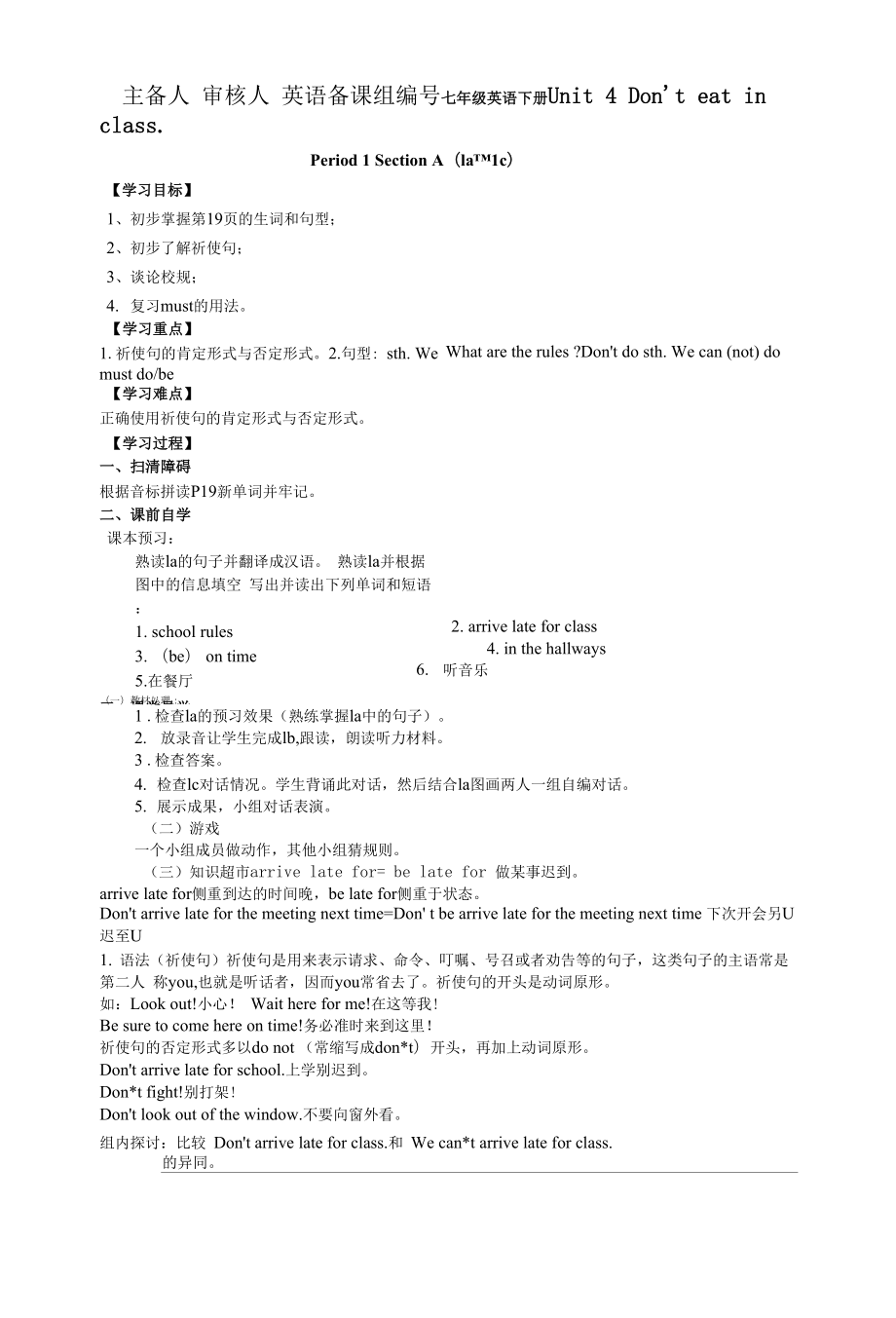《Unit4 Section A(1a-1c)學(xué)案- 人教版七年級(jí)下冊(cè)英語(yǔ).docx》由會(huì)員分享���,可在線閱讀����,更多相關(guān)《Unit4 Section A(1a-1c)學(xué)案- 人教版七年級(jí)下冊(cè)英語(yǔ).docx(2頁(yè)珍藏版)》請(qǐng)?jiān)谘b配圖網(wǎng)上搜索���。
1����、主備人 審核人 英語(yǔ)備課組編號(hào)七年級(jí)英語(yǔ)下冊(cè)Unit 4 Don't eat in class.
Period 1 Section A(la?1c)
【學(xué)習(xí)目標(biāo)】
1����、初步掌握第19頁(yè)的生詞和句型;
2�、初步了解祈使句�����;
3�����、談?wù)撔R?guī)��;
4. 復(fù)習(xí)must的用法�����。
【學(xué)習(xí)重點(diǎn)】
1.祈使句的肯定形式與否定形式����。2.句型: sth. We must do/be
【學(xué)習(xí)難點(diǎn)】
正確使用祈使句的肯定形式與否定形式����。
【學(xué)習(xí)過(guò)程】
一、掃清障礙
根據(jù)音標(biāo)拼讀P19新單詞并牢記�����。
二、課前自學(xué)
課本預(yù)習(xí):
熟讀la的句子并翻譯成漢語(yǔ)�。 熟讀la并根據(jù)圖中的信息填空 寫出并
2、讀出下列單詞和短語(yǔ):
1. school rules
3. (be) on time
5.在餐廳
三�、課堂導(dǎo)學(xué)
What are the rules ?Don't do sth. We can (not) do
6.
2. arrive late for class
4. in the hallways
聽音樂(lè)
(一)教材處理:
1 .檢查la的預(yù)習(xí)效果(熟練掌握l(shuí)a中的句子)。
2. 放錄音讓學(xué)生完成lb,跟讀�,朗讀聽力材料。
3 .檢查答案����。
4. 檢查lc對(duì)話情況。學(xué)生背誦此對(duì)話�����,然后結(jié)合la圖畫兩人一組自編對(duì)話��。
5. 展示成果��,小組對(duì)話表演���。
(二)游
3、戲
一個(gè)小組成員做動(dòng)作�����,其他小組猜規(guī)則。
(三)知識(shí)超市arrive late for= be late for 做某事遲到����。
arrive late for側(cè)重到達(dá)的時(shí)間晚,be late for側(cè)重于狀態(tài)���。
Don't arrive late for the meeting next time=Don' t be arrive late for the meeting next time 下次開會(huì)另U遲至U
1. 語(yǔ)法(祈使句)祈使句是用來(lái)表示請(qǐng)求��、命令��、叮囑����、號(hào)召或者勸告等的句子�,這類句子的主語(yǔ)常是第二人 稱you,也就是聽話者,因而you常省去了��。祈使句的開頭是動(dòng)詞原形��。
4�、如:Look out!小心! Wait here for me!在這等我!
Be sure to come here on time!務(wù)必準(zhǔn)時(shí)來(lái)到這里��!
祈使句的否定形式多以do not (?����?s寫成don*t)開頭,再加上動(dòng)詞原形��。
Don't arrive late for school.上學(xué)別遲到���。
Don*t fight!別打架!
Don't look out of the window.不要向窗外看��。
組內(nèi)探討:比較 Don't arrive late for class.和 We can*t arrive late for class.
的異同��。
四��、當(dāng)堂檢測(cè)
(一
5��、) 選擇填空。
()1. If you arrive lateclass, you must sayto your teacher.
A. for, thanksB. for, sorryC. to, sorry()2. 一 Can you sing in the classroom?
A. Yes, you can.B. No, I can.C. Yes, we can.
()3. Don't arrive late. You must betime.
A. toB. onC. at()4. Please listenthe teacher carefully (認(rèn)真地).
A. toB. onC. at()5. Don'tTV after class.
A. watchB. watchesC. watching
(二) 用所給單詞的適當(dāng)形式填空����。
1. What about(take) a walk ?
2. (not arrive) late for class.
3. He can't(stand) the idea now.
4. (not read) in the sun.
5. (not play) on the road. Tfs dangerous.
五、課后反思
 Unit4 Section A(1a-1c)學(xué)案- 人教版七年級(jí)下冊(cè)英語(yǔ).docx
Unit4 Section A(1a-1c)學(xué)案- 人教版七年級(jí)下冊(cè)英語(yǔ).docx

